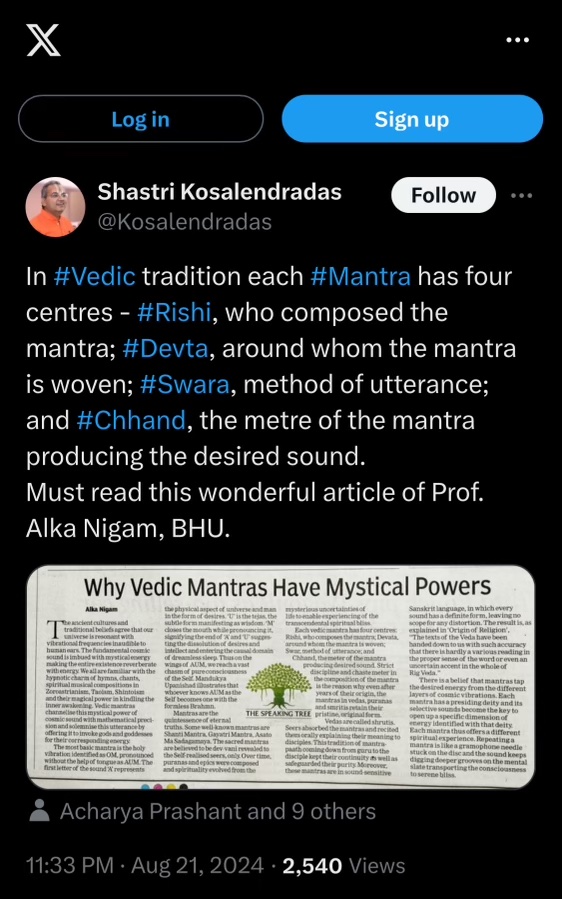Blog by Alka Nigam at Speaking Tree.in
https://www.speakingtree.in/blog/environment-680465
Om Dyauh Shaantir Antarikssam Shaantih
Prithivi Shantir Aapah Shantir –Ossadhayah Shantih
Vanaspatyah Shantir- -Vishve-Devaah Shaantir – Brahma Shaantih
Sarvam Shaantih ………
This shloka from Veda encompasses the ancient wisdom of our saints which recognizes and salutes the vast unlimited powers of Nature. It apotheosizes the powers of air, water, earth, sky and fire. People of India having immense faith in the beliefs of saints showed deep reverence for these powers and worshipped them in the forms of deities. These deities can control the happenings that our sanatan philosophy identifies with the operation of natural law. The laws are universal and recognized in various ways. Greeks and Romans too have gods for these different elements and operate on the same level of natural laws. It is always believed that Nature returns whatever man offers. Thus good and bad both are returned in abundance as in the case of the Greek warrior Ulysses who in retribution of his deeds was helped immensely and also suffered greatly the fury of Nature. On his departure from the island of Aeolus he gets the favour of the king who tied up a leather bag with the dangerous winds packed inside with a silver string and commanded fair winds to blow the bark smoothly. He also had to suffer the wrath of Neptune who transformed his vessel into a rock. The epics of Homer and Virgil are loaded with stories of heroes who accepted the confrontation and enjoyed the blessings of the mythological gods representing the various aspects of Nature and thus were transformed by their creators into superheroes. The stories from the epics of Ramayana, Mahabharata and Puranas are still alive in Indian psyche. In these stories Nature is lovingly humanized, given a name and kept very near to hearts and homes. Every single flower and animal that is dear to our gods is associated with divinity and embedded in our imagination. Rivers are worshipped to the extent that a jar of the sacred water of Ganges will be found in any Hindu household. The mountains are seen as the abode of gods and thus considered holy just as the Mount Olympus is the abode of Greek gods.
Nature has given mankind everything in ample for its needs. Man too has taken its bounty with reverence and has lived in its close proximity praying to be always remain thus blessed. Nature encompasses all living and non-living things – vegetation, microorganisms, rocks, minerals, water, air, earth, sky, animals and birds. Our ancestors connected this treasures with the daily lives of humans through religion. It teaches mankind that all living and non-living organisms are inter-dependent on each other and that extinction of one will snap the chain of fertility, prosperity and well being of all others . Our gratefulness is expressed in traditional reverence. Women folk tie a thread around Bargad tree and make a toran from the mango leaves symbolizing fertility with a wish to ever increase the progeny of their family, sit under the amla tree, place an earthern lamp before Tulsi plant every day and under peepal every Saturday, listen to the story of God Satya Narayan placing Him under the canopy of banana leaves to bless with all that is shreya and preya. Deodar is linked with gods. The banyan tree is said to be eternal because even when hacked the tree phoenix like jumps back to its glory. Rishi Uddalak taught the whole spectrum of Vedic knowledge –TAT TWAM ASSI to his son Shwetketu citing the example of the empty inside 0f the seed of this mighty banyan tree. The Kalpa Taru is not just a wish–fulfilling tree in our mythology: it is a whole spiritual concept to maintain the ecological balance of our planet. The ancient mythological stories—Indian, Biblical, Greek, Roman, Hebrew –link Nature with divinity keeping in mind the huge role it plays in the existence of human life.
These days the world has been rudely awakened by the fury and the destruction created by Nature. We have used it in our necessity, we have abused it in our greed and it has lost its balance. The harmony that prevailed between man and nature has evaporated in the heat of modern development. It is not paradoxical but an ironical fact that the ecological balance can be kept in order if the civilized human activity is kept under discipline. Alternative technological means that are not damaging to environment can provide water and energy to people. In India many movements mostly led and nourished by rural villagers and women to save our forests, rivers and the settlement on the banks –like Chipko Movement, Narmada Bachao, and the exemplary love of Bishnoi women for the trees and animals –are examples to prove that this is possible if only we once more place our belief in the kalyankari aspect of Nature.
Our sages have shown us the way. Let us go back to Mother Nature with the same love for a long life of our magnificent planet.

Leave a Reply